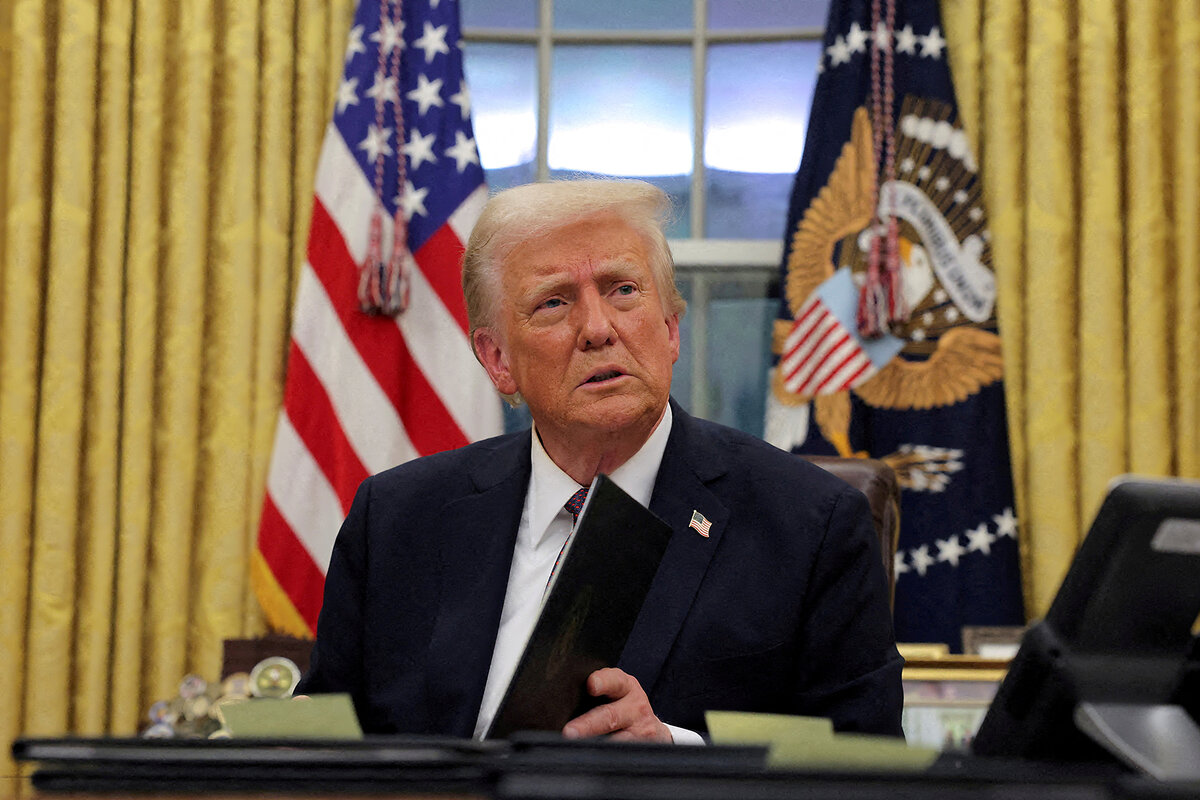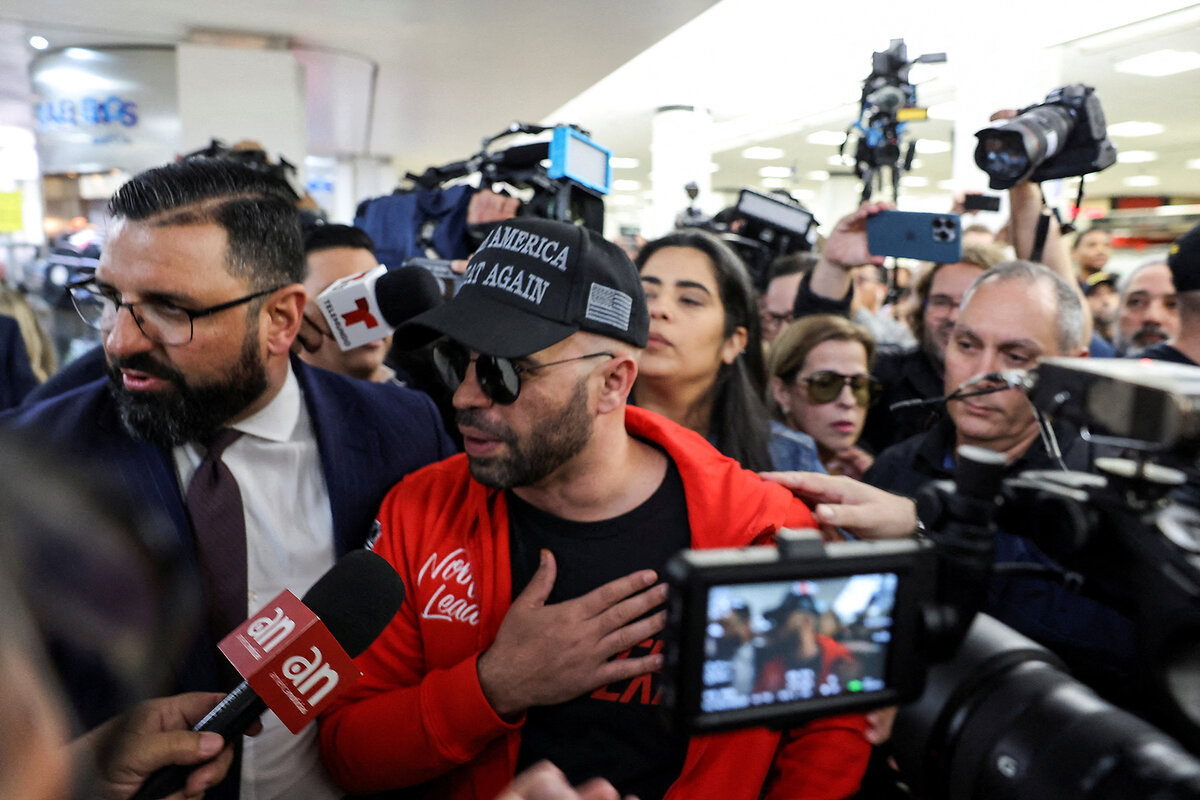Police say Jan. 6 pardons carry future risk for law enforcement
Loading...
As a police union boss, Jim Palmer has the ultimate duty to support the well-being of over 10,000 men and women in blue throughout Wisconsin.
Now, Mr. Palmer and police across the nation say that their safety may have been undermined by the nation’s chief executive, who ran a law-and-order presidential campaign and benefited from endorsements from many local and national union chapters.
On Day 1 of his new term in office this week, President Donald Trump pardoned nearly 1,600 people convicted or facing criminal charges for attacking the U.S. Capitol on Jan. 6, 2021, injuring more than 130 police officers. He had telegraphed his intent to issue Jan. 6 pardons, but the immediate and near-total reprieve – just 14 defendants had serious sentences commuted rather than pardoned – surprised many Americans.
Why We Wrote This
In the wake of President Trump’s pardons for the Jan. 6 rioters, police question the long-term effect on police and public safety.
“Many officers are disappointed,’’ says Mr. Palmer, executive director of the Wisconsin Professional Police Association.
The National Association of Police Organizations – of which the WPPA is a member – firmly opposed the pardons Tuesday. Likewise, the Fraternal Order of Police and the International Association of Chiefs of Police jointly voiced concerns that when those who commit crimes – particularly violent acts that target police – don’t face consequences, “it sends a dangerous message that could embolden others.”
The unions also criticized former President Joe Biden, who, before leaving office this month, commuted the sentence of someone convicted of killing law enforcement officers. However, their joint statement followed President Trump’s Inauguration Day action.
Police safety – and public safety – at stake
Given this pushback, President Trump’s pardons, particularly for those convicted of attacking police, could be a political miscalculation.
For many Americans – most of whom oppose pardons for Jan. 6 rioters – it corrodes the notion that violence against officers is an attack on America’s tradition of, and appreciation for, law and order.
“When police officers are killed or injured, it’s almost comparable to a political assassination,” says Michael Scott, a former Madison, Wisconsin, police officer and now a criminologist at Arizona State University in Tempe. “There’s a risk that some people will interpret this action as the president saying, ‘You are soldiers in our revolution.’”
Many who stormed the Capitol on Jan. 6 were acting based on President Trump’s false claims of winning the 2020 election and were aiming to prevent the certification of Mr. Biden’s victory that was scheduled to occur that day.
The concerns about President Trump’s pardons aren’t merely about abstract principles. People who attacked officers physically on Jan. 6, and against whom officers testified in court, are being freed. Those individuals have heard President Trump call them “patriots” and “political prisoners.”
Enrique Tarrio, the former Proud Boys leader convicted of seditious conspiracy for his role in organizing the Capitol riot, has called for retribution against those who investigated and prosecuted the Jan. 6 defendants.
“The people who did this, they need to feel the heat,” Mr. Tarrio said on a podcast after his release this week. “We need to find and put them behind bars for what they did.”
At least one former D.C. law enforcement officer has said he sought a protective order this week, unsuccessfully, against those who assaulted him on Jan. 6.
Many beat cops have enjoyed Mr. Trump’s pro-police banter over the past decade, especially after controversial incidents including the murder of George Floyd by a Minneapolis police officer prompted protests demanding police reform across the nation. Police unions’ early endorsement of Mr. Trump likely played a part in his 2016 victory.
But the unions’ pushback this week against the president’s new pardons is no surprise, experts say.
“If their support is truly rooted in [the belief] that Trump is committed to a more aggressive understanding of the criminal justice system, well, this isn’t that,” says Benjamin Levin, a professor at Washington University in St. Louis School of Law.
The pardons for those who attacked the U.S. Capitol included those who didn’t commit violence as well as those who carried firearms, Tasers, and knives into the melee, according to the U.S. attorney’s office.
Juries also convicted some on charges of seditious conspiracy, which refers to activities that undermine a state without directly attacking it.
Defending the pardons
Mr. Trump defended the pardons to reporters this week at the White House.
“They’ve served years in jail,” Mr. Trump said, according to press accounts. “They should not have served,” he said, adding, “We pardoned people that were treated unbelievably poorly.”
People convicted of hurting or killing police officers routinely face the toughest of sentences compared with other crime convictions.
In opposing the Jan. 6 punishments, Trump supporters often suggest that there was a failure to hold social justice rioters on the political left to account. But during the 2020 protests, some of which were accompanied by rioting, police arrested at least 11,000 people, according to a tally by BuzzFeed.
Mr. Trump also defended his move by citing Mr. Biden’s slew of pardons, including those for House Jan. 6 committee members and his own relatives.
Even as the avalanche of presidential pardons may set a worrisome precedent, Professor Levin says there is also room for meaningful reforms in the U.S. criminal justice system – including raising awareness among reform skeptics about how abstract notions of crime and punishment play out in the real world.
“Part of what makes the reaction to Jan. 6 interesting is the degree to which Trump and his supporters are more willing to look at the context of punishment,” he says.
At the same time, one of the Jan. 6 defendants has objected to Mr. Trump’s action. Pamela Hemphill rejected her presidential pardon, telling her local newspaper, the Idaho Statesman, that accepting the pardon “would be an insult to the Capitol Police officers, to the rule of law, to our nation.’’
Her sense of affront was mirrored in the reaction from police unions this week.
“There is a genuine and very deep-seated concern in American law enforcement that much of what they have sworn allegiance to, for a long time, is in jeopardy,” says Professor Scott, who also served as chief of police in Lauderhill, Florida. “Police ... give meaning to the Constitution. That [meaning] is essentially being renegotiated. That’s profound stuff.”








